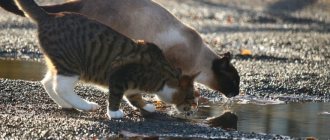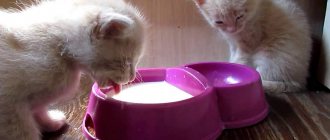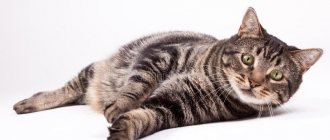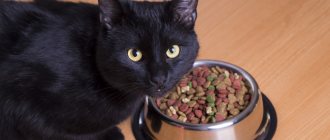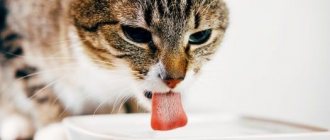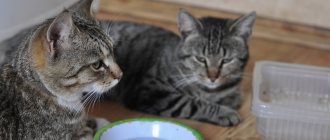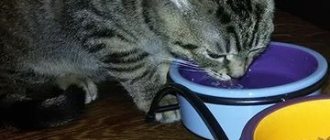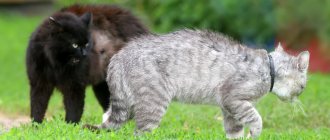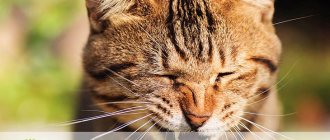Sometimes it happens that a cat refuses food and water. This behavior can be alarming, especially if the pet has been eating well before. The cause can be both harmless provoking factors and serious diseases that require complex treatment. If your pet continues to refuse food and water, this is a rather alarming sign.
- 2 What diseases can cause
2.1 Reasons for refusing food - video - 2.2 When you can’t put off visiting a doctor
- 3.1 What to do if your pet doesn’t eat, doesn’t drink and constantly sleeps
Why doesn't my cat eat or drink for several days?
A pet may refuse food and water for a number of reasons. The most common reason is poor health. This is possible under stress, which is associated with a sudden change in environment, renovations, noisy parties, etc. Cats are very sensitive to any changes, so the body can react in a similar way.
In some cases, the problem is caused by unpalatable food. If there is a sudden change in diet, the pet may not react to this in the best way. Especially if the food is cheap and of poor quality. In this case, the problem can be solved very simply - you need to return to your usual diet.
A stressed cat may not eat or drink for several days.
Kittens may refuse food and water due to gastrointestinal disorders. The fact is that a small pet has a weak immune system, and any error in the diet can provoke digestive disorders, which are accompanied by poor appetite and loose stools. Additional factors: subcutaneous ticks, fleas and other parasitic infections.
Attention! If the pet does not want to eat or drink, then first of all you need to look at the fur and skin, which should be normally clean. Then you need to pay attention to the cat's nose. If it is wet, then the temperature is within normal limits.
A sick animal may refuse food and water during the period of exacerbation of the inflammatory process, as the body fights the pathology. Such abstinence from food often does not exceed several days. Additionally, your pet's body temperature may increase. After the fever disappears, appetite is quickly restored. In this case, it is important to clarify what disease caused the symptoms.
A sick cat is often lethargic and refuses water and food.
An old cat may lose its appetite due to inflammatory diseases of the urinary system. Gradually, the animal accumulates salt crystals in its urine (this is associated with an abundance of sodium in dry food), which provokes the formation of stones that can clog the urinary ducts. An additional reason is inflammation of the gums, since the teeth of an old pet often crumble and fall out, which contributes to the occurrence of periodontitis, gingivitis and other similar pathologies.
Old cats are often susceptible to inflammatory gum disease
One of the common reasons for loss of appetite and refusal to drink water is poisoning. This can happen at any age. A cat can be poisoned by some kind of chemical by licking it from the floor, as well as by poisonous plants, stale food, and insects. Intoxication is often accompanied by refusal of food, water, fever, loose stools and vomiting.
Another reason why your pet suddenly began to refrain from eating could be a foreign body stuck in the throat. At the same time, the animal behaves strangely, hides, vomits, and the cat may also wheeze while trying to push the object out.
What should be done if the cat is weakened?
Change the food and watch the cat.
If the cat refuses to eat for a long time, has lost weight and is weak, but has no other manifestations of the disease, then the cat should be left alone for up to 12–24 hours, and the food should also be changed - possibly refusing to eat. only psychological in nature.
However, if at least one negative symptom is added to refusal to eat and losing weight, you should immediately contact specialists for qualified help or advice.
In the clinic, the necessary tests will be taken, an ultrasound examination will be performed - all this will help to establish the true reason that influenced such a reaction on the part of the cat.
The following will also be held:
- examination of the oral cavity;
- palpation of the abdomen;
- temperature measurement;
- weighing.
Examination of the oral cavity.
A general blood and urine test is necessary to identify inflammatory processes, the presence of parasites, disorders of the kidneys, and diabetes is also established. It is important to remember that if there are suspicions of serious illness, then it is best to start treatment on the first day after the onset of negative symptoms.
What diseases can cause
The following diseases can provoke loss of appetite and refusal of water in cats:
- malignant tumors - can be asymptomatic for a long time, most often affecting old animals, which at the same time begin to rapidly lose weight and prefer a sedentary lifestyle;
- renal failure - can occur in a pet at any age, while the cat rarely goes to the toilet, urine is excreted in small quantities;
- helminthic infestations are a common cause of loss of appetite in an animal at any age; in addition, symptoms such as stool disorders, weight loss, hair loss, vomiting, etc. are often present;
- fungal diseases - accompanied by deterioration of appetite, refusal of water, hair loss, skin rashes, itching and a general unsatisfactory condition in which the cat refrains from active games;
- intestinal obstruction - can be the result of stuck hairballs, helminthic infestation, while the pet does not go to the toilet and tries to hide.
Fungal diseases in cats can cause loss of appetite
Cats may refuse food and water during estrus, which is associated with hormonal changes in the body. As a rule, appetite is restored within a few days.
A friend’s cat suddenly lost his appetite and drank very little. At first she thought it had something to do with the extreme heat. Then the cat began to hide and lost a lot of weight. When I came to visit her and called my pet, he came out of hiding. He was terribly thin and could barely sit. Suddenly I discovered a sore on his withers and a lack of hair in this place. She advised me to immediately contact a veterinarian, as I suspected the presence of a tick. I recommend carefully examining your pets if their appetite worsens and they refuse water. Provoking factors are not always as harmless as they may seem at first glance. Now the cat has almost fully recovered, but long-term therapy is still required.
Reasons for refusing food - video
When you can't put off visiting a doctor
If within three days the cat’s appetite is not restored and it refuses to drink, then it is necessary to urgently consult a doctor, as the risk of dehydration is high. It is also important to visit a specialist if your animal has the following symptoms:
- vomit;
- hair loss;
- rash;
- loose stools;
- elevated temperature;
- weakness.
Attention! Owners should be wary if their pet hides all the time and avoids contact. This may indicate a severe pathological process in the body.
When to rush to the vet
Within 24 hours after discovering that the cat is not eating or drinking, you should simply observe it, paying attention to other symptoms, if any. But even if in general the pet’s condition does not cause concern (refusal of food and drowsiness are the only signs), it is still worth consulting with a veterinarian, because many pathologies have a hidden course (for example, the presence of malignant tumors becomes obvious only in the later stages).
If you have the following symptoms, you should contact your veterinarian as soon as possible:
- vomiting and diarrhea - usually always accompany poisoning or infectious diseases, and also increase the risk of rapid dehydration;
- increased temperature - it should be remembered that a temperature of up to 39 degrees is normal for cats, and only exceeding this indicator indicates a fever;
- rashes of any type - we can talk about both an allergic reaction and an infection;
- hair loss - may be a symptom of an infectious lesion or parasitic infestation.
You should be especially wary if the pet hides in secluded corners and avoids contact with the owner - only very sick animals behave this way.
How and how to help an animal
If a cat refuses food and water, then the first thing to do is take your pet to a veterinarian. It is not possible to make a diagnosis on your own at home, so you need to call a doctor at home or take your pet to the clinic.
If it is impossible to get to the veterinarian in the next 24 hours, then you need to provide the cat with rest. To do this, you should prepare a clean litter; it should not be too soft or too hard. If an animal is hiding, you should not force it out of its hiding place. You can only place a bowl of food and fresh water nearby.
Bowls of water and food should always be available to the animal.
Under no circumstances should you try to give your pet any medications without first consulting a doctor. Otherwise, you can only cause harm and provoke life-threatening consequences.
If the doctor has determined the cause, then you should follow the specialist’s recommendations and give medications according to instructions in the required dosages. This must be done calmly; you must not cause pain to the animal. Before giving medication, the cat needs to be stroked, and the tone of voice should be calm. This way, the pet will tolerate the treatment better, will not resist too much and will recover faster.
Additional recommendations:
- If the cause is stress, then the cat should be left alone for a while. It is advisable to call her to eat in a gentle tone. A calm and quiet environment, the absence of extraneous noise and periodic stroking will help you recover from stress.
- If your pet doesn't like the food, you need to replace it as soon as possible. It is recommended to give preference to balanced foods rather than cheap options containing a lot of harmful additives.
- In case of gastrointestinal upset and poisoning, you can give the animal activated charcoal (500 mg per 1 kg of weight). In this case, the tablet must be crushed and dissolved in 1 tsp. water. It is most convenient to give medicine using a syringe without a needle. It is enough to do this procedure once before seeing a doctor.
- Ticks and fleas are eliminated using special antiparasitic medications. You should not use them on your own; you should first consult your doctor. However, if this is not possible in the near future, and the animal has fleas or a tick is found, you can purchase Bars or Celandine shampoo.
- If the cause is helminthic infestations, then treatment is carried out with the help of anthelmintic drugs. The medication should be given only according to the regimen recommended by the doctor. Otherwise, larvae may remain, which will provoke a relapse.
- To alleviate the condition of an animal with gum inflammation, you can use a solution of Miramistin or potassium permanganate. It is necessary to treat the gums using a cotton pad and the selected product. This needs to be done 2 times a day. Do not press on problem areas.
A weak solution of potassium permanganate can be used to treat inflamed gums
What to do if your pet doesn’t eat, doesn’t drink and constantly sleeps
If an animal does not eat or drink, and also sleeps constantly, then this is an alarming signal of serious health problems. However, in extremely rare cases this is associated with stress. In this case, the pet should be left alone and allowed to rest. There is no danger in inactivity after stress. If the animal is lethargic, does not eat or drink for another reason, then postponing a visit to the doctor is dangerous, since with a serious pathology the cat may die.
Some recommendations that will help you hold out until the doctor arrives:
- It is necessary to ensure that fresh air enters the room.
- Do not disturb the pet. If there are other animals in the house, then for safety reasons it is better to isolate them from contact with the sick cat.
- Make sure the water in the bowl is always clean.
- If there is a special medicinal herb for cats in the house, which breeders often grow in pots, then you can pick a little and put it next to your pet. If desired, the animal can be treated with such a safe remedy.
Attention! If a cat does not drink for more than 24 hours, it can cause death. In this case, water must be injected forcibly using a thin syringe without a needle, gradually pouring it into the mouth.
How to help a kitten
If the kitten does not eat anything or drink water, then first of all you need to pay attention to the nature of the food. Small pets need special soft food. It is impossible to give a kitten food intended for adult animals, since the gastrointestinal tract of babies is still very weak. Long-term refusal of water is dangerous, so you can give your pet water using a pipette. Every hour you need to give water forcibly. The liquid should be administered in small quantities - one pipette at a time is enough.
Giving your kitten water using a pipette will prevent dehydration
In addition, the kitten should be carefully examined for rashes, sores and fleas. Particular attention should be paid to the withers and ears. If everything is clean, then most likely the problem lies in the functioning of the internal organs, which can only be determined in a clinical setting.
Attention! If a kitten has a sore in the withers area, under no circumstances should you burn it with iodine or brilliant green. This may indicate the presence of a mite or lichen. In this case, you need to undergo the necessary tests and isolate children and other animals from contact with the kitten until complete recovery.
Problems with the tray
It is quite logical that a pet that does not eat will stop visiting the litter box. But how can we explain the situation when he hasn’t walked much for several days, while eating normally? In such cases, you should look for answers in the tray. Perhaps he was not washed well enough, or he was moved to another place, and the mustachioed conservative is protesting... This behavior is typical for cats.
© shutterstock
Most likely, your pet still goes to the toilet. Just not in the usual place, but somewhere under the bed. It is necessary to conduct a “search” and put the tray in order. If “traces of a crime” are not found, time passes, and the situation does not get better (the tray is still empty), it’s time to sound the alarm.
Prevention measures
Prevention rules that will help avoid problems:
- Make sure water and food bowls are always clean.
- Include only high-quality food in your pet's diet.
- Try not to expose your cat to stressful situations.
- Brush the coat regularly. This must be done using a furminator. This procedure will prevent the accumulation of hair in the cat’s gastrointestinal tract after licking.
- Eliminate the presence of cockroaches in the house, which can carry serious infections.
- Protect your pet from contact with street animals.
- Regularly wet-clean the floor.
- Do not give your cat any medications without consulting a doctor.
- Deworm your pet once every 4–6 months.
To protect your animal from a number of diseases, it is recommended to keep outdoor shoes in the closet. This is important to prevent the cat from coming into contact with bacteria that can easily be carried home on the soles.
If a cat loses its appetite and feels unsatisfactory, then there is no need to try to cure it at home. If the provoking factor is not serious and does not pose a threat to life, then the pet will recover in the next 24–48 hours. When this does not happen, you should immediately consult a doctor.
Treatment and help at home
When treating with antibiotics, it is necessary to determine the sensitivity to antibiotics in the cat's body.
The main treatment is prescribed by a veterinarian based on the results of the diagnosis and tests, since it is specific for each disease. The chosen therapy is aimed at eliminating not only the symptoms, but also the cause that caused the malaise and, as a consequence, refusal to eat with subsequent weight loss.
So, antibiotics are prescribed when there is a need to get rid of parasites and take measures aimed at maintaining the body after surgery.
Help at home should be provided after consultation with a doctor, since the owner may not recognize the true reason for refusing to eat, therefore, the animal may become worse after self-treatment. It is necessary to carefully monitor the cat's condition, as this will allow you to verify the presence or absence of symptoms. You can warm up the food (canned meat) a little, so its smell will be stronger. It is important that it is not very hot.
Complete refusal to eat
Try mixing her favorite food and medicinal food.
Sometimes lack of appetite, weakness and weight loss are due to the fact that the cat refuses new food, for example, dietary food prescribed by a specialist to treat another disease. In this case, you should gradually mix the animal’s usual food with dietary food . Then the likelihood that the cat will not refuse food will be higher.
It is important to remember that special attention should be paid to the feeding process of kittens under six months of age. You can include cow's milk in your diet.
Why might a cat refuse to eat?
A cat can refuse to eat for an incredible variety of reasons. Most diseases can begin with this common symptom.
If your cat has one of the following signs, then you better go to the veterinarian without delay:
- lethargy
- increase in body temperature
- vomit
- diarrhea
- constipation
- difficulty urinating or no urination at all
- discharge from the nose and/or eyes
- open mouth breathing (“like a dog”)
The reasons that a cat is not eating are not necessarily related to illness. Lack of appetite in cats can be influenced by various factors:
- The cat has already eaten))). Check to see if he ate something secretly from you, or if he opened the door of the cabinet or even the refrigerator. This also happens. Cats can be very inventive and persistent in their desires. Interview relatives - perhaps someone has already fed the pet.
- Any change in the type and quality of feed. Cats are often very sensitive to the composition of food, its consistency, temperature, and smell. And even with a small change, they may not touch the food. Sometimes it can even be the same ready-made food, but from a new pack. Or the same food, but with a slightly different taste. Or instead of a can of jelly, you bought pate. Not to mention homemade food, where it is impossible to keep the ingredients identical. Therefore, think about what might have changed over the last 1-2 days in your pet’s diet. The transition from one type of food to another should be carried out gradually, over 7-10 days, by mixing the new food with the old one.
- Changing the external environment in the apartment. Has the bowl been moved to a place that is not comfortable for the cat? Have they placed something unusual in the place where the cat prefers to eat (a large bag, a broom).
- Stress. Cats are very sensitive to stressful situations: traveling with them somewhere, the arrival of strangers in the house, the appearance of a robot vacuum cleaner, even the smell brought on clothes can provoke a reaction from the mustachioed pet and lead to a decrease or lack of appetite.
- Features of sexual behavior. During the period of active sexual hunting, both male and female cats may experience a decrease in appetite. The reproductive instinct overcomes basic physiological needs
